Therapeutic Recreation Treatment Plan: Day Care, Home, Community
VerifiedAdded on 2022/11/14
|5
|908
|308
Project
AI Summary
This project presents a therapeutic recreation treatment plan, focusing on Mr. Hassan Zraika's case. The plan addresses day care services, home-based programs, and community-based initiatives, outlining goals, modalities, and referral strategies for each. It includes a detailed assessment of the client's profile, including his background, current living situation, and communication abilities. The treatment plan emphasizes the use of medical modalities, such as skilled assessment and rehabilitation, to improve the participant's health. It also identifies the importance of involving medical staff, occupational therapists, nurses, pharmacists, and social workers to achieve the desired outcomes. The project adheres to the provided assignment brief, incorporating learning outcomes, assessment procedures, and evidence-based practices to develop a comprehensive and effective treatment plan for the client's well-being.
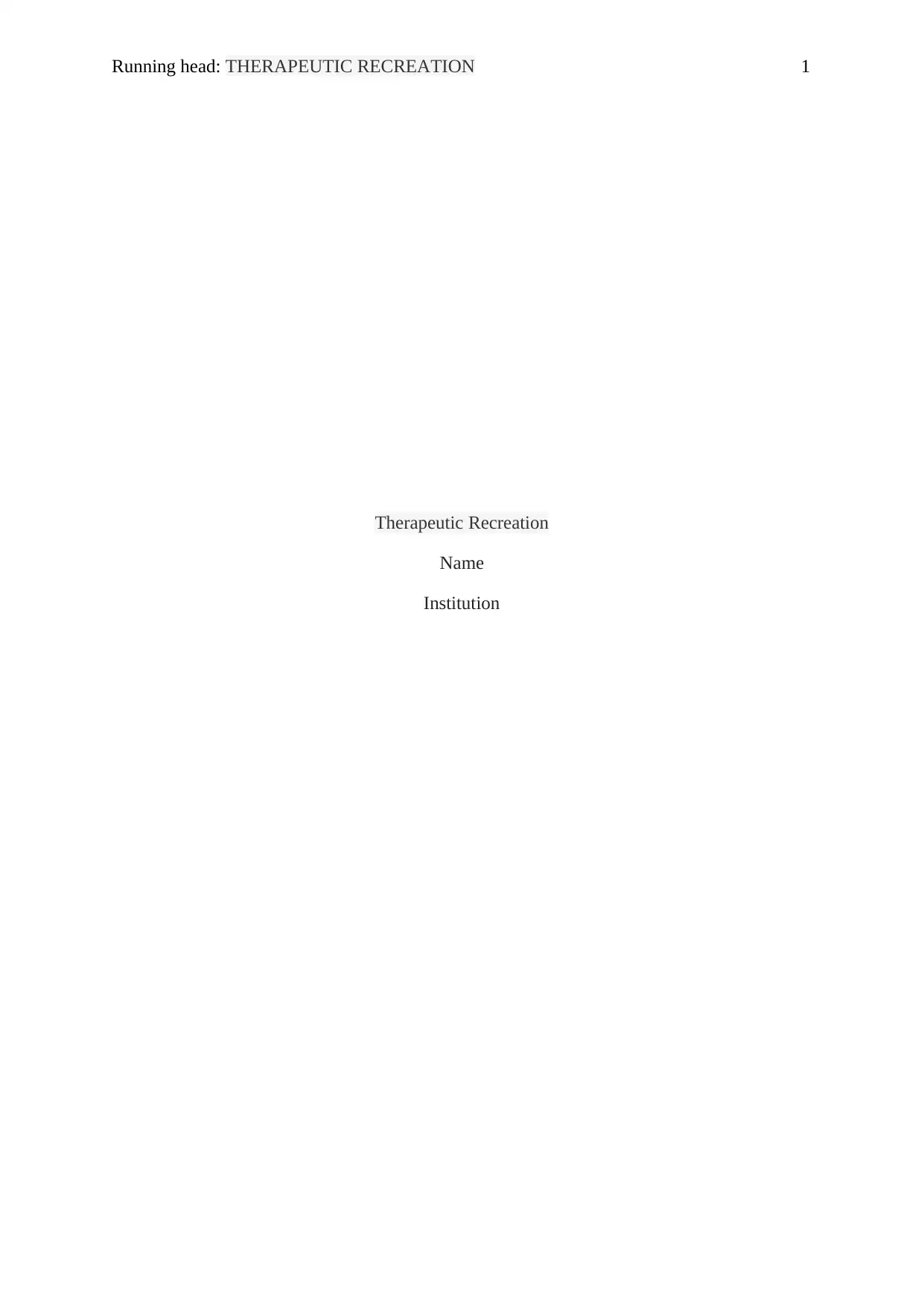
Running head: THERAPEUTIC RECREATION 1
Therapeutic Recreation
Name
Institution
Therapeutic Recreation
Name
Institution
Paraphrase This Document
Need a fresh take? Get an instant paraphrase of this document with our AI Paraphraser
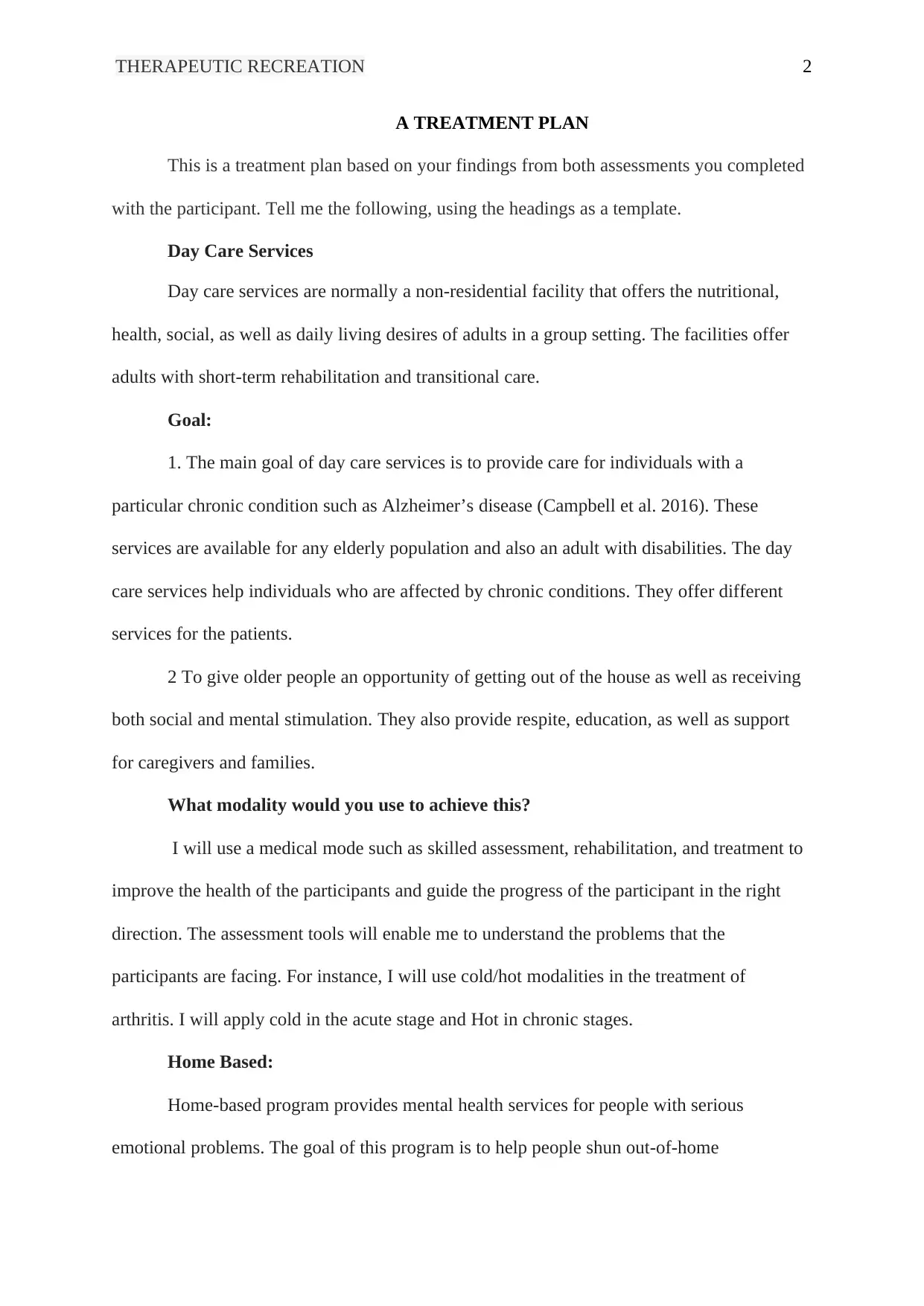
THERAPEUTIC RECREATION 2
A TREATMENT PLAN
This is a treatment plan based on your findings from both assessments you completed
with the participant. Tell me the following, using the headings as a template.
Day Care Services
Day care services are normally a non-residential facility that offers the nutritional,
health, social, as well as daily living desires of adults in a group setting. The facilities offer
adults with short-term rehabilitation and transitional care.
Goal:
1. The main goal of day care services is to provide care for individuals with a
particular chronic condition such as Alzheimer’s disease (Campbell et al. 2016). These
services are available for any elderly population and also an adult with disabilities. The day
care services help individuals who are affected by chronic conditions. They offer different
services for the patients.
2 To give older people an opportunity of getting out of the house as well as receiving
both social and mental stimulation. They also provide respite, education, as well as support
for caregivers and families.
What modality would you use to achieve this?
I will use a medical mode such as skilled assessment, rehabilitation, and treatment to
improve the health of the participants and guide the progress of the participant in the right
direction. The assessment tools will enable me to understand the problems that the
participants are facing. For instance, I will use cold/hot modalities in the treatment of
arthritis. I will apply cold in the acute stage and Hot in chronic stages.
Home Based:
Home-based program provides mental health services for people with serious
emotional problems. The goal of this program is to help people shun out-of-home
A TREATMENT PLAN
This is a treatment plan based on your findings from both assessments you completed
with the participant. Tell me the following, using the headings as a template.
Day Care Services
Day care services are normally a non-residential facility that offers the nutritional,
health, social, as well as daily living desires of adults in a group setting. The facilities offer
adults with short-term rehabilitation and transitional care.
Goal:
1. The main goal of day care services is to provide care for individuals with a
particular chronic condition such as Alzheimer’s disease (Campbell et al. 2016). These
services are available for any elderly population and also an adult with disabilities. The day
care services help individuals who are affected by chronic conditions. They offer different
services for the patients.
2 To give older people an opportunity of getting out of the house as well as receiving
both social and mental stimulation. They also provide respite, education, as well as support
for caregivers and families.
What modality would you use to achieve this?
I will use a medical mode such as skilled assessment, rehabilitation, and treatment to
improve the health of the participants and guide the progress of the participant in the right
direction. The assessment tools will enable me to understand the problems that the
participants are facing. For instance, I will use cold/hot modalities in the treatment of
arthritis. I will apply cold in the acute stage and Hot in chronic stages.
Home Based:
Home-based program provides mental health services for people with serious
emotional problems. The goal of this program is to help people shun out-of-home
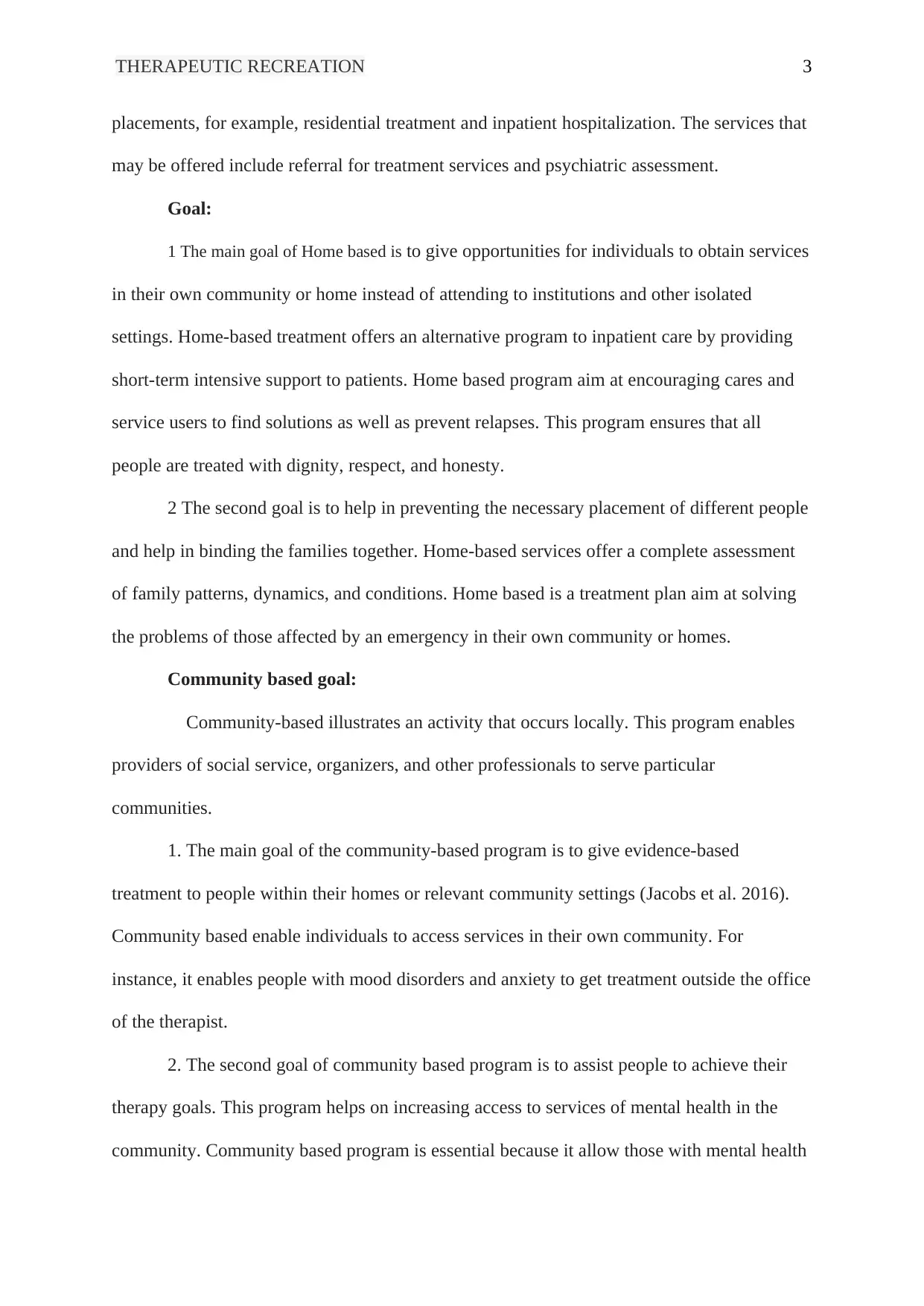
THERAPEUTIC RECREATION 3
placements, for example, residential treatment and inpatient hospitalization. The services that
may be offered include referral for treatment services and psychiatric assessment.
Goal:
1 The main goal of Home based is to give opportunities for individuals to obtain services
in their own community or home instead of attending to institutions and other isolated
settings. Home-based treatment offers an alternative program to inpatient care by providing
short-term intensive support to patients. Home based program aim at encouraging cares and
service users to find solutions as well as prevent relapses. This program ensures that all
people are treated with dignity, respect, and honesty.
2 The second goal is to help in preventing the necessary placement of different people
and help in binding the families together. Home-based services offer a complete assessment
of family patterns, dynamics, and conditions. Home based is a treatment plan aim at solving
the problems of those affected by an emergency in their own community or homes.
Community based goal:
Community-based illustrates an activity that occurs locally. This program enables
providers of social service, organizers, and other professionals to serve particular
communities.
1. The main goal of the community-based program is to give evidence-based
treatment to people within their homes or relevant community settings (Jacobs et al. 2016).
Community based enable individuals to access services in their own community. For
instance, it enables people with mood disorders and anxiety to get treatment outside the office
of the therapist.
2. The second goal of community based program is to assist people to achieve their
therapy goals. This program helps on increasing access to services of mental health in the
community. Community based program is essential because it allow those with mental health
placements, for example, residential treatment and inpatient hospitalization. The services that
may be offered include referral for treatment services and psychiatric assessment.
Goal:
1 The main goal of Home based is to give opportunities for individuals to obtain services
in their own community or home instead of attending to institutions and other isolated
settings. Home-based treatment offers an alternative program to inpatient care by providing
short-term intensive support to patients. Home based program aim at encouraging cares and
service users to find solutions as well as prevent relapses. This program ensures that all
people are treated with dignity, respect, and honesty.
2 The second goal is to help in preventing the necessary placement of different people
and help in binding the families together. Home-based services offer a complete assessment
of family patterns, dynamics, and conditions. Home based is a treatment plan aim at solving
the problems of those affected by an emergency in their own community or homes.
Community based goal:
Community-based illustrates an activity that occurs locally. This program enables
providers of social service, organizers, and other professionals to serve particular
communities.
1. The main goal of the community-based program is to give evidence-based
treatment to people within their homes or relevant community settings (Jacobs et al. 2016).
Community based enable individuals to access services in their own community. For
instance, it enables people with mood disorders and anxiety to get treatment outside the office
of the therapist.
2. The second goal of community based program is to assist people to achieve their
therapy goals. This program helps on increasing access to services of mental health in the
community. Community based program is essential because it allow those with mental health
⊘ This is a preview!⊘
Do you want full access?
Subscribe today to unlock all pages.

Trusted by 1+ million students worldwide
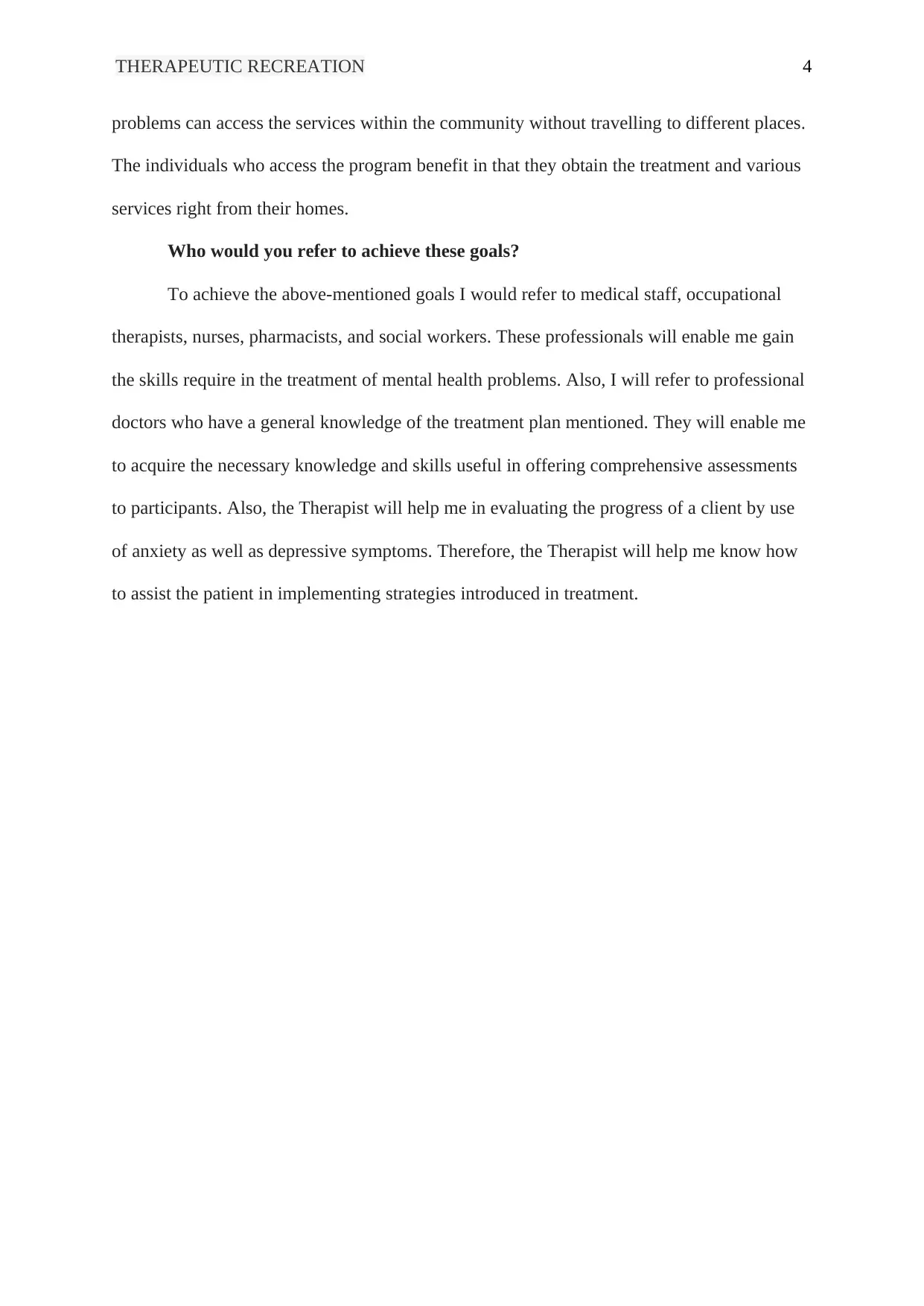
THERAPEUTIC RECREATION 4
problems can access the services within the community without travelling to different places.
The individuals who access the program benefit in that they obtain the treatment and various
services right from their homes.
Who would you refer to achieve these goals?
To achieve the above-mentioned goals I would refer to medical staff, occupational
therapists, nurses, pharmacists, and social workers. These professionals will enable me gain
the skills require in the treatment of mental health problems. Also, I will refer to professional
doctors who have a general knowledge of the treatment plan mentioned. They will enable me
to acquire the necessary knowledge and skills useful in offering comprehensive assessments
to participants. Also, the Therapist will help me in evaluating the progress of a client by use
of anxiety as well as depressive symptoms. Therefore, the Therapist will help me know how
to assist the patient in implementing strategies introduced in treatment.
problems can access the services within the community without travelling to different places.
The individuals who access the program benefit in that they obtain the treatment and various
services right from their homes.
Who would you refer to achieve these goals?
To achieve the above-mentioned goals I would refer to medical staff, occupational
therapists, nurses, pharmacists, and social workers. These professionals will enable me gain
the skills require in the treatment of mental health problems. Also, I will refer to professional
doctors who have a general knowledge of the treatment plan mentioned. They will enable me
to acquire the necessary knowledge and skills useful in offering comprehensive assessments
to participants. Also, the Therapist will help me in evaluating the progress of a client by use
of anxiety as well as depressive symptoms. Therefore, the Therapist will help me know how
to assist the patient in implementing strategies introduced in treatment.
Paraphrase This Document
Need a fresh take? Get an instant paraphrase of this document with our AI Paraphraser
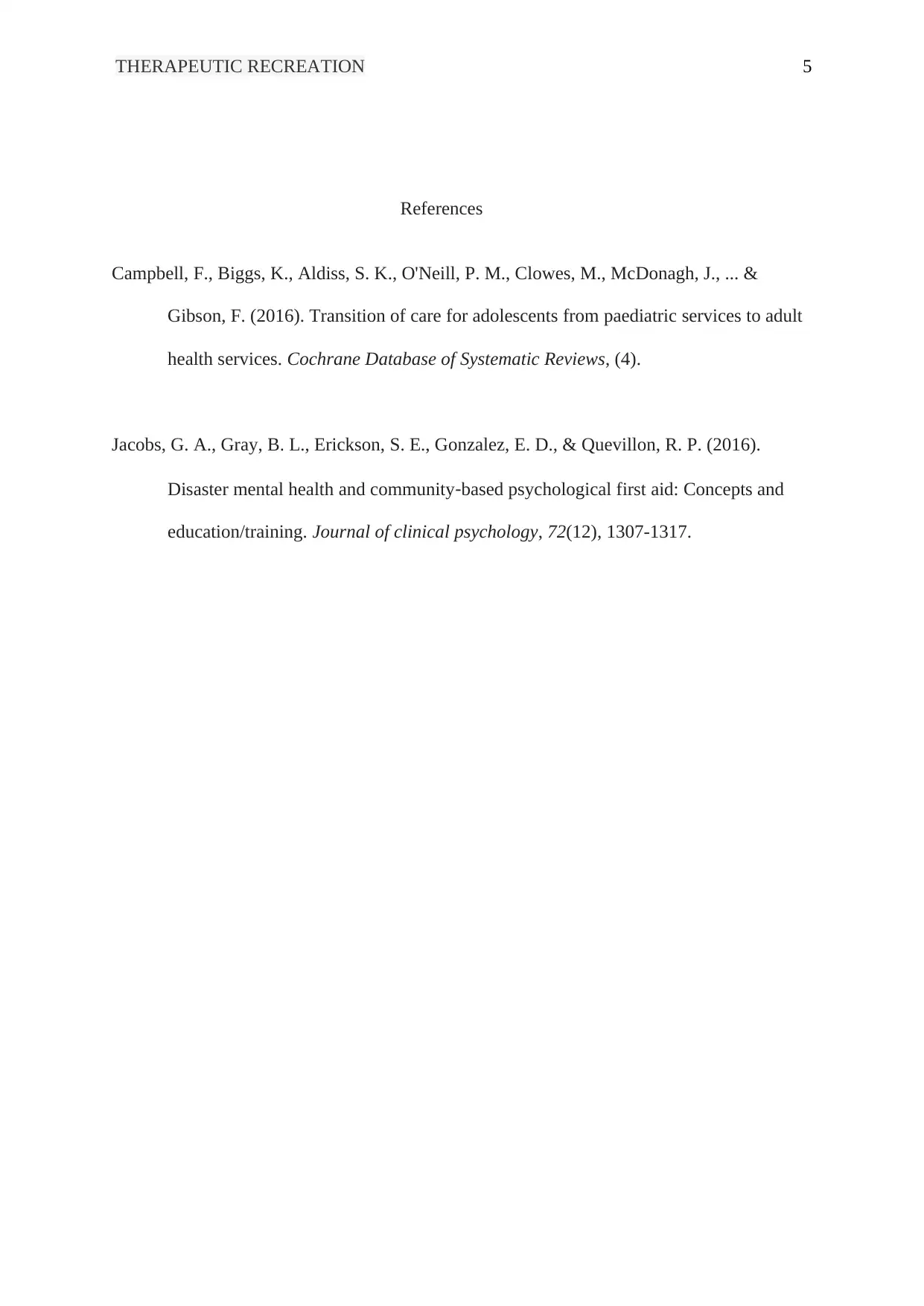
THERAPEUTIC RECREATION 5
References
Campbell, F., Biggs, K., Aldiss, S. K., O'Neill, P. M., Clowes, M., McDonagh, J., ... &
Gibson, F. (2016). Transition of care for adolescents from paediatric services to adult
health services. Cochrane Database of Systematic Reviews, (4).
Jacobs, G. A., Gray, B. L., Erickson, S. E., Gonzalez, E. D., & Quevillon, R. P. (2016).
Disaster mental health and community‐based psychological first aid: Concepts and
education/training. Journal of clinical psychology, 72(12), 1307-1317.
References
Campbell, F., Biggs, K., Aldiss, S. K., O'Neill, P. M., Clowes, M., McDonagh, J., ... &
Gibson, F. (2016). Transition of care for adolescents from paediatric services to adult
health services. Cochrane Database of Systematic Reviews, (4).
Jacobs, G. A., Gray, B. L., Erickson, S. E., Gonzalez, E. D., & Quevillon, R. P. (2016).
Disaster mental health and community‐based psychological first aid: Concepts and
education/training. Journal of clinical psychology, 72(12), 1307-1317.
1 out of 5
Related Documents
Your All-in-One AI-Powered Toolkit for Academic Success.
+13062052269
info@desklib.com
Available 24*7 on WhatsApp / Email
![[object Object]](/_next/static/media/star-bottom.7253800d.svg)
Unlock your academic potential
Copyright © 2020–2026 A2Z Services. All Rights Reserved. Developed and managed by ZUCOL.





